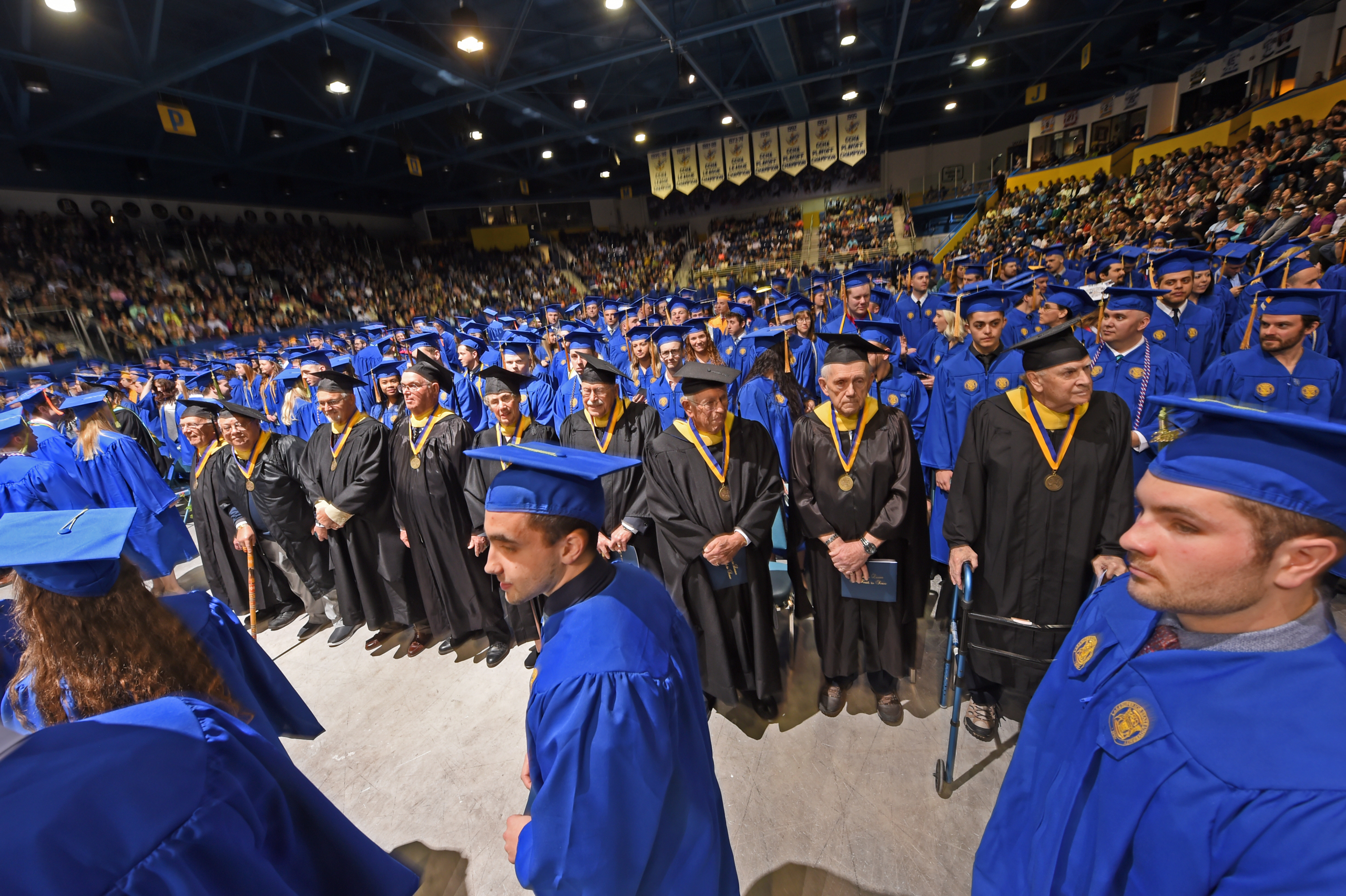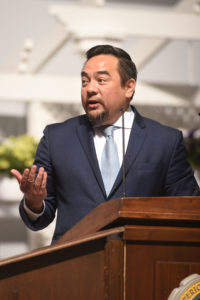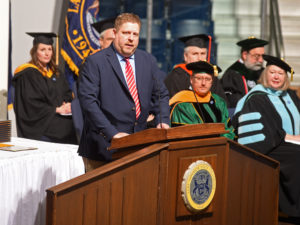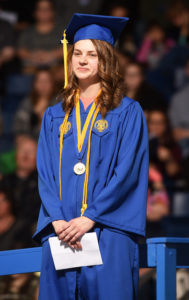
BRIDGING PAST AND FUTURE — Lake Superior State University 2018 graduates file past Golden Graduates who received their LSSU degrees more than fifty years ago, during the university’s annual commencement ceremony on May 5 in Sault Ste. Marie. The ceremony included an address by Keith M. Harper, noted Native American attorney and former ambassador to the United Nations Human Rights Council, a posthumous honorary doctorate to LSSU professor of history emeritus James Moody, and words from biochemistry graduate Jennifer Wickens. (LSSU/John Shibley)
Nearly 500 undergraduates received diplomas during Lake Superior State University’s 56th commencement exercise, held May 5 in Sault Ste. Marie, Mich.
The ceremony featured Keith M. Harper, noted Native American attorney and former ambassador to the United Nations Human Rights Council, as keynote speaker. A posthumous honorary doctorate was given to LSSU professor of history emeritus James Moody, and student respondent Jennifer Wickens provided words of wisdom and encouragement to her fellow graduates.
The ceremony included announcement of this year’s recipient of the LSSU Distinguished Teaching Award, Dr. Paul Kelso.

Commencement speaker Keith M. Harper was appointed by President Obama as the U.S. Ambassador and Permanent Representative to the United Nations Human Rights Council in 2007, the first Native American appointed as U.S. ambassador to such a post. He spoke to graduates of the importance of mastering fear to achieve accomplishment.
“As I was preparing for this address I felt the presence of an old friend, fear,” Harper said. “If you want to be successful you will have to get to know fear, especially fear of failure.”
Harper is best known in legal circles for his work in Cobell v. Salazar, a class-action lawsuit – the largest against the United States in history – brought by individual Native Americans against federal agencies that mismanaged billions of dollars of income and assets held in trust, dating back to the 1800s. Harper served as class counsel on behalf of upwards of 500,000 individual American Indians and successfully settled the case in 2009 for $3.4 billion.
“After law school I wanted to represent Indian tribes, and went to work for Native American Rights Fund,” Harper said. “A couple of years into practice, an incredibly brave Blackfoot woman, Eloise Cobell, approached me to take this case. Fear of disappointing thousands for justice made us strong. Because of her bottomless courage, I faced my fear well.”
Harper also touted what he described as American exceptionalism as something graduates and their families should continue to embrace.
“I am not a person who sees perfection in our history or foreign policy,” Harper said. “But we can claim the inheritance of a people who strived towards a more perfect union. American values include sensibility that all people should be treated fairly, free to talk their minds, and a nation of laws not men.”
Harper said that in his travels around the world he has seen many places where these simple understandings do not exist. “These values have allowed the American experiment to transcend challenges and come out stronger,” he added.
Harper closed his remarks with an appeal for American unity.
“Divisions sap our strength and undermines our faith in democracy,” he said. “Be an engine of unity . . . give those you politically disagree with the benefit of the doubt that they do not harbor ill motives. Build bridges across communities and perceive differences.”

Lake Superior State University bestowed an Honorary Doctorate of Humane Letters during the ceremony to History Professor Emeritus James W.T. Moody, who passed away in Dec. 2017. Moody taught history and the humanities to thousands of LSSU students over the years since his hiring in 1971. He continued to teach well beyond his official retirement in May 2010, continuing to serve as an instructor through the fall 2017 semester.
Accepting the honor was family friend James Money, a former student and son of Moody’s colleague, Prof. Robert Money.
Known for his black suits, bow ties, and straw hats, his larger-than-life persona cut a well-known and beloved figure on campus and around town.
“Those of you who knew James may have thought of him as a country squire plucked from a leather reading chair out of Oxford, but he wasn’t,” said Money. He was born during the Depression on a rural family farm . . .the first in his family to attend college, going on to become a Fulbright Scholar.”
“I would like to thank every student that James ever taught, or had a conversation with, or influenced in any way,” Money said in closing. “That’s what James lived for; you don’t do something for 26 years unless you love it.”

Student respondent Jennifer Wickens has wanted to be a doctor since she was 16. She begins medical school this fall to pursue a career as a family or emergency physician. She officially graduated last December with a bachelor of science degree in biochemistry, summa cum laude.
She shared with her fellow grads some observations during her years Lake State.
“Dreams are worth pursuing,” she said. “We all earned our place to be here today because our dreams are worth fighting for. Helping others is energy well spent. I have seen through your actions the importance of caring for others. You have constantly showed me that life is lived well when we live for something greater than ourselves.”
Wickens also learned that what one does now does not define who you are and what you will be.
“At Lake State, I have seen people slip and fall, but then get back up with grace and confidence,” Wickens said. “As our commencement speaker said today, trying and failing doesn’t make you failure. Winning doesn’t make you a winner. Tomorrow you will still be you.”
LSSU faculty and students will continue to build on Wickens’ work in cloning and protein research. Many undergraduate research projects in the natural and applied sciences carry on for years and launch yet others in sometimes unexpected directions.
See an archived video of the 2018 commencement exercise.
Read about Paul Kelso receiving the Distinguished Teaching Award for 2018 and Dr. Mitchell’s 2018 charge to the graduates.